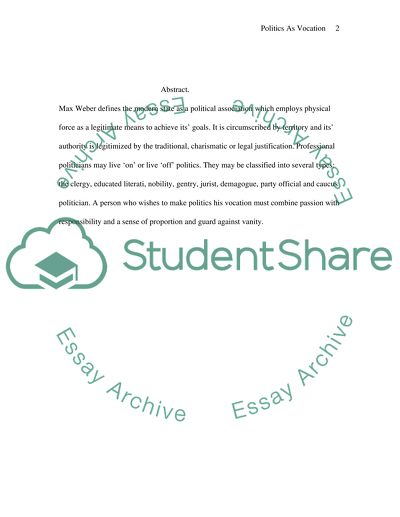Cite this document
(Max Webers Definition of the Modern State and Politics as a Vocation Article Example | Topics and Well Written Essays - 1500 words, n.d.)
Max Webers Definition of the Modern State and Politics as a Vocation Article Example | Topics and Well Written Essays - 1500 words. https://studentshare.org/politics/1538816-what-for-weber-are-the-distinctive-features-of-the-modern-state-and-what-kind-of-qualities-are-to-be-found-in-those-who-have-a-vocation-for-politics
Max Webers Definition of the Modern State and Politics as a Vocation Article Example | Topics and Well Written Essays - 1500 words. https://studentshare.org/politics/1538816-what-for-weber-are-the-distinctive-features-of-the-modern-state-and-what-kind-of-qualities-are-to-be-found-in-those-who-have-a-vocation-for-politics
(Max Webers Definition of the Modern State and Politics As a Vocation Article Example | Topics and Well Written Essays - 1500 Words)
Max Webers Definition of the Modern State and Politics As a Vocation Article Example | Topics and Well Written Essays - 1500 Words. https://studentshare.org/politics/1538816-what-for-weber-are-the-distinctive-features-of-the-modern-state-and-what-kind-of-qualities-are-to-be-found-in-those-who-have-a-vocation-for-politics.
Max Webers Definition of the Modern State and Politics As a Vocation Article Example | Topics and Well Written Essays - 1500 Words. https://studentshare.org/politics/1538816-what-for-weber-are-the-distinctive-features-of-the-modern-state-and-what-kind-of-qualities-are-to-be-found-in-those-who-have-a-vocation-for-politics.
“Max Webers Definition of the Modern State and Politics As a Vocation Article Example | Topics and Well Written Essays - 1500 Words”. https://studentshare.org/politics/1538816-what-for-weber-are-the-distinctive-features-of-the-modern-state-and-what-kind-of-qualities-are-to-be-found-in-those-who-have-a-vocation-for-politics.


